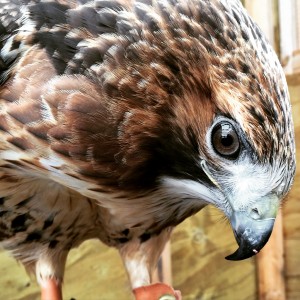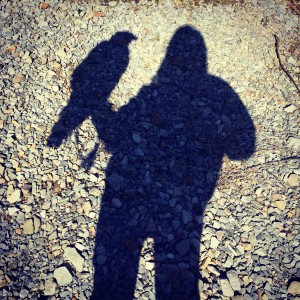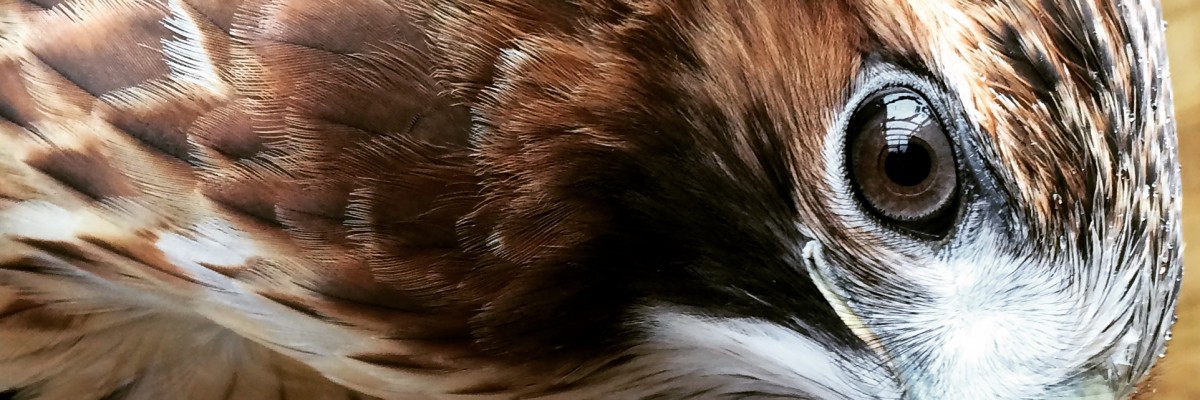 When my husband Jesse and two of his friends from veterinary school set out for a weekend fishing trip in West Virginia’s Canaan Valley, they weren’t planning to pick up a hitchhiker. But when one of them noticed a large red-tailed hawk perched low on a stump along a roadside creek, they slowed down. Something was off about her posture, and the three of them crashed through the underbrush after the hawk. She couldn’t fly, and in a few minutes, they caught her. Jesse quickly realized that the end of the hawk’s wing was missing; sticky blood clumped over an exposed nub of bone. Later, radiographs revealed a dusting of metal near the wound—evidence that she’d been shot.
When my husband Jesse and two of his friends from veterinary school set out for a weekend fishing trip in West Virginia’s Canaan Valley, they weren’t planning to pick up a hitchhiker. But when one of them noticed a large red-tailed hawk perched low on a stump along a roadside creek, they slowed down. Something was off about her posture, and the three of them crashed through the underbrush after the hawk. She couldn’t fly, and in a few minutes, they caught her. Jesse quickly realized that the end of the hawk’s wing was missing; sticky blood clumped over an exposed nub of bone. Later, radiographs revealed a dusting of metal near the wound—evidence that she’d been shot.
Jesse starting calling her “Canaan” because of where they found her. In West Virginia, we pronounce it Ca-NAIN, rather than the biblical CAIN-an. The region is beautiful, unique, and wild—perhaps holy, perhaps a promised land. It’s easy for me to imagine divine intervention: what are the odds that a car full of veterinarians would come across a gravely injured hawk along a backcountry road?
But she would need more than a miracle to fly again; a hawk needs full use of its wings to take to the air. Back at Cheat Lake, we admitted Canaan to the Avian Conservation Center of Appalachia, the nonprofit organization that Jesse and I helped found. The hawk received fluid therapy, antibiotics, anti-inflammatory medication, and of course fresh mice. But because she could not return to the wild, she faced two possible fates: humane euthanasia, or a lifetime in captivity. A grounded hawk is tragic. In his poem “Hurt Hawks,” Robinson Jeffers writes of shooting an injured redtail, a bird that “had nothing left but unable misery.”
I watched Canaan as she convalesced. Did she, too, have nothing left but “unable misery”? She clutched a rope-wrapped perch with one taloned foot and curled the other beneath her body, and she watched me watch her. She seemed calm. She chirped to me like a sparrow before I fed her.
Deciding to keep a wild animal in captivity feels like playing God. But someone else’s cruel, illegal actions had already changed her destiny. A human with a rifle ended her wild life. And now another human would decide whether her life would end altogether, or would continue unnaturally, forcing her to live alongside us, away from her hawk kin, away from the open sky.
 We made the decision, applied for and were granted a federal permit to keep Canaan for educational purposes. Perhaps a child will see her in a classroom or a church basement, and that will be enough: enough to keep him from shooting a hawk, enough to make him notice birds, enough to care about wildlife, water pollution, climate change. Perhaps Canaan will change the future—perhaps she can make it a better, safer, healthier place for hawk’s everywhere. A promised land. Milk and honey.
We made the decision, applied for and were granted a federal permit to keep Canaan for educational purposes. Perhaps a child will see her in a classroom or a church basement, and that will be enough: enough to keep him from shooting a hawk, enough to make him notice birds, enough to care about wildlife, water pollution, climate change. Perhaps Canaan will change the future—perhaps she can make it a better, safer, healthier place for hawk’s everywhere. A promised land. Milk and honey.
Now, every day I walk Canaan. We are building trust. She steps onto my glove and I hand her a small piece of mouse. We turn, we bend, we go through doors, we meet people. Soon, she will travel to schools, libraries, camps. We have a job to do, and we take it seriously. For the sake of the hawks, for the sake of us all.
